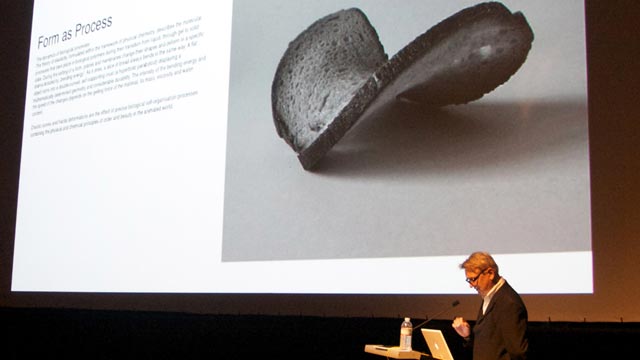Oksiuta @ EMPAC
Faculty Lecture:
A Biological Future?

In his research, Rensselaer Architecture professor Zbigniew Oksiuta develops living biological habitats by combining art, architecture, engineering, and the biological sciences. His work looks beyond historical, social, urbanistic, and aesthetic factors to reduce the notion of space to its absolute minimum: the physical and chemical parameters that enable physiological existence. In this two-part lecture, presented as part of the Detail View: Campus Perspective series, Oksiuta will examine dynamic systems that transfer information and energy through a liquid medium. Using biological polymers as building material, he has developed liquid, jelly-like, and rigid shapes on a human scale for unusual gravitational conditions, which enable the development of new kinds of living habitats in the biosphere and in space.
The underlying narratives are driven by contrasting conceptions of the role of the artist and of time. The first sees the artist as anticipating the powers and dangers of techno-scientific progress through idiosyncratic experiments, with time as linear and progressive. The second sees the artist as re-constituting past historical ruptures and forgotten pathways to envision alternative ways of being contemporary with a more cyclical sense of progress.
Curator: Paula Gaetano
February 14—
I. Form, Processes, Consequences
The basic unit of life—the cell—has a spatial and architectural connotation. However, the living cell is not a chamber; it is a clump of sticky liquid protoplasm, which works as a chemical factory in dynamic communication with its surroundings. The cell produces and manages all of the processes that we need to survive.
Can life processes, which normally take place on the nanoscale of proteins, acids, and saccharides, happen on a macroscale? Oksiuta’s research explores the possibility for biological processes to occur on an architectural scale. His projects, Spatium Gelatum, Breeding Spaces, and Beyond Gravity use information embedded in biological matter to develop semiliquid membranes as bioreactors for breeding.
April 12—
II. A Biological Future?
In the context of his research on living biological habitats, Professor Oksiuta will present work developed by Rensselaer Architecture students in his Human Habitat as Biological Living System design studio course.